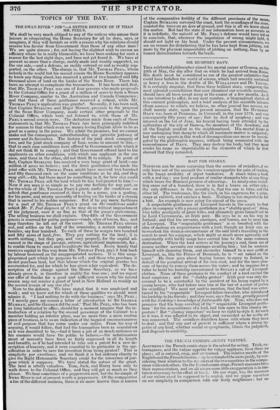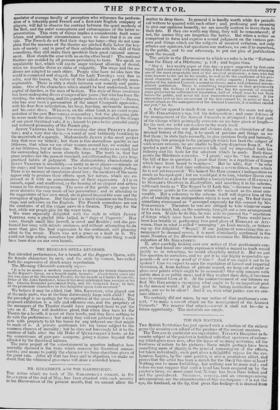THE FRENCH COMEDY—JENNY VERTPRI'.
ASSUREDLY the French comic stage is the school for acting. Trick, ex- travagance, and the vulgar appetite for vulgar applause, have there no place ; all is natural, easy, and unstained. The relative merits of the English and the,French theatre, lay be estimated the more justly, by con- sidering their relation to the nu:liners of the two countries in the compa- rison with each other. On the French comic stage, French manners have their representation, and on all stages some little exaggeration is in imi- tation necessary to the effect of truth. On our stage, too, the manners of our nation must be supposed to be copied, and we pique ourselves on our simplicity in comparison with our lively neighbours ; but no
spectator of average faculty of perception who witnesses the perform- ance of a tolerably good French and a first-rate English company of players, will fail to observe the contrast between the quiet modesty of
the first, and the outré conceptions and extravagance of the latter re-' presentation. This state of things implies a considerable fault some`i where, and attendant circumstances serve to show that it is on our side. The French do not find their stage too tame—they do not com- plain that the manners of the theatre are pitched flatly below the key- note of society : and in proof of their satisfaction with the skill of their comedians, they still make their spectacle their great national amuse- ment. How stands the case with us on the other hand ? The national theatres are avoided by all persons pretending to taste. We speak an unpalatable fact, which will excite anger without allowing of denial, when we describe them as sinks of vulgarity. The stage and the au- dience are adapted to each other. People who have no idea how the world is composed and shaped, find the Lady Townleys very fine in satin, and the beaux, by virtue of their rakish coats, perfectly unex- ceptionable. There is only a shade between our comedy and panto mime. One of the characters which should be best understood, in our capital of dandies, is the man of fashion. The style of these creatures has been undergoing divers changes of late years ; but who has been the standing, the unvarying, and the popular pattern on the stage ? —JONES, who has ever been a personation of the smart Cheapside apprentice, with his haw haw articulation, his busy, bustling, mercantile manner, and his outré dress. WRENCH, on the other hand, is an exact repre- sentation of the past BRITMAIELL coxcombry ; but the playgoing pub- lic never made the discovery. From the mere imagination of the doings of our great theatrical vats, it is l leasant to pass to the graceful gaiety and unforced pleasantry of the French play. JENNY VERTPRE has been the evening star since PERLET'S depar- ture; and a very star she is,—a world of soul brilliantly twinklingin the magnitude of a spangle. Mademoiselle JENNY is the most perfect fairy that ever we beheld ; but there is this marvellous quality in her littleness, that when we see other women around her, we wonder not at her littleness, but at their size. She does not strike us as small, but the surrounding ladies seem clumsily large. The truth is, that her grace renders her the present standard, notwithstanding the eye's long- practised habits of judgment. The distinguishing characteristic of JENNY VERTPRE is sensibility,—a rarity in most places—a miracle on the stage ; and her business seems to be not acting, but simply-feeling. There is no manner of simulation about her.; the incidents of the scene appear only to produce their effects upon her nature, which are ex- pressed as if with no consciousness of their expression. All is as smooth, equal, and unaffected, as the bearing of an elegant and artless
woman in the drawing-room. The sense of the public eye upon her never disturbs the easy mode of her personation ; and in attending to the suggestions of her own mind, she is placed beyond the care and the corruption of applause. But this last is a merit common on the French stage, and unknown on the English. The French comedians are not the creatures of all the vulgar paws in a theatre. They play for the best, while 'our people play for the worst taste.
We were especially delighted with the style in which JENNY VERTPRE sung a playful little ballad, in " Sage et Coquette." Her
voice, though small like herself, is sweet and flexible ; and she per- formed her song with infinite archness, and without attempting; to do more than give the best expression to the sentiment, and pleasing effect to the music. There was not a grace or a fault in it. We could not help asking ourselves how differently the same thing would have been done on our own boards.



















 Previous page
Previous page